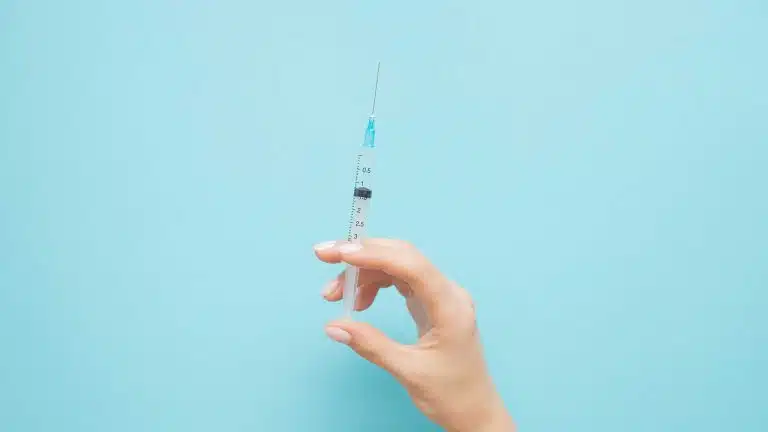Valium Intravenous (IV) Use | Effects & Dangers Of Injecting Valium

Benzodiazepines, also known as benzos, are a class of anxiolytic (anti-anxiety) drugs that produce sedative effects. They target gamma-aminobutyric (GABA) receptors in the brain which results in slower brain activity and a feeling of calm.
Valium (diazepam) is a benzo that may be prescribed for:
- panic disorder
- hypotension
- status epilepticus (seizures that are continuous)
- muscle spasms
- alcohol withdrawal
Since Valium is known to cause sedation, some develop Valium addiction. This can lead to more creative ways of administering the drug, including injection without medical assistance.
Valium Injection
Valium is administered via injection in some medical scenarios. Depending on the patient, their medical history, and their current needs, an IV of Valium can be injected by a healthcare professional.
The IV must be at room temperature and when injected, the medication enters the muscle and the effects occur almost instantly. A diazepam autoinjector can even be used. However, it’s important to acknowledge that this is a very delicate process.
If administered too fast, heart problems can occur. In addition to this, an injection to a vein must be very slow as to not irritate the vein.
Effects Of Diazepam Abuse
If you inject diazepam without medical supervision, it’s likely a form of drug abuse. When abusing diazepam or taking it in ways not directed, you may experience a wide range of side effects such as:
- dizziness
- headache
- fatigue
- impaired coordination
- difficulty concentrating
- trouble with memory
Valium Addiction
Valium addiction can occur after a period of drug abuse. For example, one might begin by taking Valium orally, but then start snorting, smoking, or injecting the benzodiazepine.
This continued abuse can lead to substance use disorder or addiction. Addiction is characterized by continuing to use Valium despite harmful consequences.
Dependence & Withdrawal Symptoms
When using a benzodiazepine such as Valium, you should never stop “cold turkey.” Always speak to your primary doctor or a healthcare professional who can assist you.
Withdrawal symptoms may include:
- nausea
- tremors
- irritability
- muscle weakness
- dizziness
- changes in blood pressure
- seizures
Adverse Effects
When using Valium with other medications, it’s important to remember that paradoxical reactions can occur which may cause:
- aggressive behavior
- psychosis
- hallucinations
- impairment
- restlessness
Dangers Of Injecting Valium
When addiction leads someone to inject a benzodiazepine instead of taking it orally, the situation can become serious quite quickly. Before receiving the diazepam injection, the person must first dissolve the pills into water.
Injecting Valium intravenously at home without medical guidance is dangerous and can lead to:
- changes in heart rate
- fluctuations in blood pressure
- drowsiness
- problems concentrating
- scabs, sores, or abscesses
- allergic reaction
Since the central nervous system (CNS) is affected by diazepam, it gives those using the drug a strong feeling of sedation. Valium injection quickly enters your bloodstream and likely produces an intense high.
Life-Threatening Effects
Injecting Valium may cause more serious and life-threatening effects from using higher doses, including:
- changes in heart rate
- fluctuations in blood pressure
- slow reflexes
- respiratory depression
- coma
- death
Furthermore, those who have certain health issues or medical conditions should steer clear from abusing Valium due to the sedation it causes. This includes elderly patients, breastfeeding women, and those with chronic obstructive pulmonary disease (COPD).
Valium and other CNS depressants can lead to respiratory depression when abused.
Dangerous Drug Interactions
If other drugs are involved, such as opioids or other benzodiazepines that cause sedative effects, there is likely an increased risk of adverse effects and overdose.
Adverse reactions can occur when you combine Valium with other medications such as:
- antidepressants
- anticonvulsants
- alcohol
- antihistamines
- barbiturates
- muscle relaxants
When drug interactions occur, the potential for an overdose increases greatly. Shooting up Valium can cause permanent and lasting damage to your physical and mental health.
Treating Valium Addiction
If you or a loved one live with substance use disorder or Valium addiction, a variety of treatment facilities are available. We offer both inpatient and outpatient options as well as a wide array of therapeutic treatments. To learn more, please contact us today.
Written by Ark Behavioral Health Editorial Team
©2024 Ark National Holdings, LLC. | All Rights Reserved.
This page does not provide medical advice.
Genetic Science Learning Center - Drug Delivery Methods
National Alliance on Mental Illness - Benzodiazepine-Associated Risks
National Alliance on Mental Illness - Diazepam (Valium)
National Institute on Drug Abuse - Benzodiazepines and Opioids
US Food and Drug Administration - Diazepam Autoinjector
US Food and Drug Administration - Valium

Questions About Treatment?
Ark Behavioral Health offers 100% confidential substance abuse assessment and treatment placement tailored to your individual needs. Achieve long-term recovery.
100% confidential. We respect your privacy.
Prefer Texting?
Our friendly support team is here to chat 24/7. Opt out any time.







 Learn More
Learn More








